Mirza
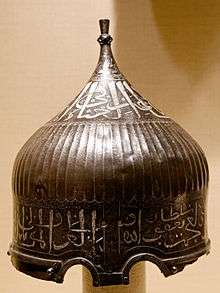 | |
|
Emperor: Caliph, Shahanshah, Padishah, Chakravarti, Khagan | |
|
High King: Sultan, Maharaja | |
|
King: Emir, Shah, Raja, Khan | |
|
Grand Duke: Nawab, Wāli, Nizam | |
|
Crown Prince: Mirza, Yuvraj, Vali Ahd | |
|
Prince : Shahzada, Şehzade, Sahibzada, Nawabzada | |
|
Earl : Dewan Bahadur, Rao Bahadur, Rai Bahadur, Khan Bahadur | |
|
Viscount: Khan Sahib, Baig, Begzada | |
|
Baron : Lala, Agha, Hazinedar |
Mirza (/ˈmɜːrzə/ or /mɪərˈzɑː/; Persian: میرزا)[1][lower-alpha 1] is a name of Persian origin. It is used as a surname or prefix to identify patriarchal lineage.
It is derived from a historical title of Persian origin (Mīrzā),[2] denoting the rank of a royal prince,[3] high nobleman,[4] distinguished military commander,[5] or a scholar.[6]
Specifically, it was used as a title by and today signifies patriarchal lineage to the various Persian Empires, the Shirvanshahs and Circassians of the Caucasus, and mainly the Mughals / Moguls or Muslim Rajputs of the Indian Subcontinent.[7] It was also a title bestowed upon members of the highest aristocracies in Tatar states, such as the Khanates of Kazan and Astrakhan.
Etymology
The word Mīrzā is derived from the Persian term Amīrzādeh which literally means child of the Amīr or child of the ruler.[8] Amīrzādeh in turn consists of the Arabic title Amīr (English: Emir), meaning "commander" and the Persian suffix zādeh, meaning "son of" or "lineage of".[9] Due to vowel harmony in Turkic languages, the alternative pronunciation Morza (plural morzalar; derived from the Persian word) is also used.
Variant spellings in English include mirzya, miriza, mirize, mirze, morsey, mursay, murse, meirsa, mirzey, mursi, murze, murza, mirza, myrza, meerza.[10]
Royal title
The titles themselves were given by the Kings, Sultans and Emperors (equivalent to the western Fount of honour) to their sons and grandsons, or even distant kins. Noblemen loyal to the kings also received this Title.
The title itself is derived from the title Emir. Emir, meaning "commander" or "Prince", is derived from the Semitic root "Amr", meaning "command". Originally it simply meant "commander" or "leader", usually in reference to a group of people. It came to be used as a title of governors or rulers, typically in smaller states, and usually renders the English word "prince". The word entered English in 1595, from the French émir.[11]
Persian Empires
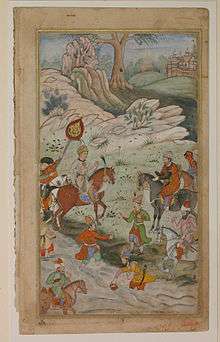
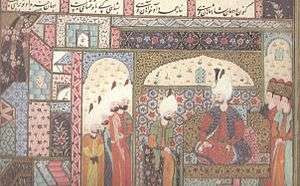
Safavid dynasty
- Padeshah Ali Mirza
- Prince Alqas Mirza
- Prince Mohammad Baqer Mirza
- Vizier Mirza Shokrollah Isfahani
- Vizier Mirza Salman Jaberi
- Vizier Mirza Shah Hossein
Afsharid dynasty
- Prince Reza Qoli Mirza
- Prince Shahrokh Mirza
- Prince Ebrahim Mirza
- Statesman Mirza Mehdi Khan
- Prince Nader Mirza
Qajar dynasty
- His Highness Prince Iraj Mirza
- His Highness Prince Malek Mansur Mirza Shao es-Saltaneh
- His Highness Prince Bahram Mirza Sardar Mass'oud
- His Highness Prince Abbas Mirza
- His Highness Prince Abdol Majid Mirza
- Highness Prince Ali-Mohammad Mirza
- His Highness Prince Bahram Mirza
- His Highness Prince Djahangir Mirza
- His Highness Prince Eskandar Mirza
- His Highness Prince Hamid Mirza
- His Highness Prince Khanlar Mirza
- His Highness Prince Khosrow Mirza
- His Highness Prince Muhammad Mirza
- His Highness Prince Mahmoud Mirza
- His Highness Prince Mohammad Hassan Mirza
- His Highness Prince Mohammad Hassan Mirza II
- His Highness Prince Ahmad Shah Qajar
- His Highness Prince Nosrat-od-Dowleh Firouz Mirza
- His Highness Prince Firouz Mirza Nosrat-ed-Dowleh Farman Farmaian III
- His Highness Prince Ali Mirza Qajar
- His Highness Prince Nosrat al-Din Mirza Salar es-Saltaneh
- His Highness Prince Abdol-samad Mirza Ezz ed-Dowleh Saloor
- His Highness Prince Mass'oud Mirza Zell-e Soltan
- His Highness Prince Mohammad Ali Mirza Dowlatshah
- His Highness Prince Mohammad Taqi Mirza
- His Highness Prince Kamran Mirza Nayeb es-Saltaneh
Shirvanshahs
Three consecutive titular kings of Shirvan, of the Shirvanshah Dynasty (present-day Azerbaijan), adopted the title as well following the death of Gurban Ali.
Circassians
Circassian Dynasty
The hereditary title of Mirza was adopted by the nobility class of the Circassians. Idar of Kabardia, also known as "Mirza Haydar Temruk Bey", was the great-grandson of Prince Inal - Sultan of Egypt the founder of the "Temruk dynasty" of the Kabardian princes, known in Russia as the "Cherkassky" a Circassian princely family.
Circassian nobility with the name Mirza include:
- Mirza Haydar Temruk Bey (ca. 1470 - 1571)
Princely Issues:
- Temruk Mirza (ca. 1501 - 1571)
- Kambulat Mirza (ca. 1510 - 1589)
- Zhelegot Mirza (ca. 1520- ?)
Russian Empire
Under Catherine the Great, empress of Russia, the Mirzas gained equal rights with the Russian nobility due to their extreme wealth. In return, the Mirzas financed her Russo-Turkish war against the Ottoman Empire.[12] Abdul Mirza was given the title Prince Yusupov, and his descendant Prince Felix Yusupov married Princess Irina Alexandrovna of Russia, the only niece of Tsar Nicholas II.
Mughal Empire
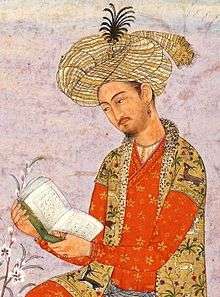

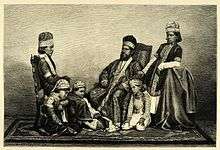
In the Indian Subcontinent (modern day Pakistan, India, Bangladesh), the title Mirza was borne by an imperial prince. It was adopted as part of ones name, implying relationship to the Turk dynasties like the Mughal Dynasty (the Imperial House of Timur).[15] In the traditional naming sequence of the Indian royal families, the title can be placed both before the name and after it, such as Prince Mirza Mughal or Prince Kamran Mirza. Prince Khusrau Mirza was the grandson of Emperor Babur (Babur Mirza), son of Emperor Jahangir and a brother of Emperor Shah Jahan. Emperor Akbar Shah II was known as Prince Mirza Akbar before his coronation. Emperor Babur took the imperial title of Padishah on 6 March 1508, before which he used the title Mirza.[16]
Mughal Dynasty of Northern India
- Mirza Zahiruddin 1523–1530, first Mughal Emperor.
- Mirza Nasiruddin 1530–1539 & 1554–1555, second Mughal Emperor.
- Mirza Jalaluddin 1555–1605, third Mughal Emperor.
- Mirza Nuruddin 1605–1627, fourth Mughal Emperor.
- Mirza Khurram 1627–1658, fifth Mughal Emperor.
- Mirza Muhiuddin 1658–1707, sixth Mughal Emperor.
- Mirza Azam 1707, seventh Mughal Emperor.
- Mirza Mu'Azzam 1707–1712, eighth Mughal Emperor.
- Sultan Muizuddin Mirza 1712–1713, ninth Mughal Emperor.
- Mouinudd'in Muhammad Mirza 1712–1719, tenth Mughal Emperor.
- Sultan Shamsuddin Mirza 1719, eleventh Mughal Emperor.
- Sultan Rafiuddin Mirza (later Shah Jahan II) 1719, twelfth Mughal Emperor.
- Sultan Nekusiyar Mirza 1719, thirteenth Mughal Emperor.
- Sultan Akhtar Mirza, fourteenth Mughal Emperor.
- Ahmad Shah Mirza 1720–1748, fifteenth Mughal Emperor.
- Aziz 'ud-Din Beg Mirza 1754–1759, sixteenth Mughal Emperor.
- Jalal 'ud-Din Mirza 1759–1760, seventeenth Mughal Emperor.
- Muhi-ul-millat Mirza 1788–1806, eighteenth Mughal Emperor.
- Mirza Akbar 1806–1837, nineteenth Mughal Emperor.
- Sirajuddin Mirza 1837–1857, Mughal Emperor.
- Mirza Abdullah, son of Bahadur Shah II 1850–1897, Mughal Emperor.
- Mirza Aziz Koka (1542–1624), foster-brother of Akbar, son of Ataga Khan
Royal Family of Bengal
Imperial Families of Central India and Bengal Because the Bengali language has no phoneme /z/, Mirza has the local form Mridha (from Mirdhjah) in Bengal and Bihar.[17]
- Mirza Shuja ud-din Muhammad Khan, second Nawab of Bengal, Bihar and Orissa.
- Mirza Asadullah, third Nawab of Bengal, Bihar and Orissa.
- Mirza Muhammad Ali, fourth Nawab of Bengal, Bihar and Orissa.
- Mirza Mohammad Siraj, fifth Nawab of Bengal, Bihar and Orissa.
- Mirza Hassan Ali Khan Bahadur, 18th Nawab of Bengal, Bihar and Orissa.
- Mirza Wasif Ali Khan, 19th Nawab of Bengal, Bihar and Orissa.
- Mirza Waris Ali Khan, 20th Nawab of Bengal, Bihar and Orissa.
Royal Family of Awadh
- Mirza Muhammad Muqim Ali Khan, second Nawab Subahdar of Awadh (Oudh)
- Mirza Amani Asif-ud-Dawlah, fourth Nawab Subahdar of Awadh
- Mirza Asif Jah Wazir Ali Khan, fifth Nawab Subahdar of Awadh
- Mirza Wajid Ali Shah, eleventh Nawab Subahdar (fifth King) of Awadh
The Royal Mughal Family of Berar
- His Highness Prince Bedar Bakht Mirza, son of Emperor Mirza Azam
- His Highness Prince Mohammed Beg Feroz Bakht Mirza, son of Prince Bedar Bakht Mirza
- His Highness Prince Bulaqui Mirza, son of Prince Mirza Feroz Bakht
- His Highness Prince Sultan Bahaddur Aduli Mirza, son of Mirza Bulaqui Baig Bahaddur
- His Highness Prince Sardar Baig Mirza, son of Aduli Baig Mirza
- His Highness Prince Qadar Baig Mirza, son of Aduli Baig Mirza
- His Highness Prince Hatam Baig Mirza, son of Sardar Baig Mirza
- His Highness Prince Umrao Baig Mirza, son of Sardar Baig Mirza
- His Highness Prince Hasan Baig Mirza, son of Umrao Baig Mirza
- His Highness Prince Alam Baig Mirza, son of Hasan Baig Mirza
- His Highness Prince MuqadderBaig Mirza, son of Hasan Baig Mirza
- His Highness Prince Dr.Hasan Baig Mirza, son of Muqadder Baig Mirza
- His Highness Prince Khaleeque Baig Mirza, son of Muqadder Baig Mirza
- His Highness Prince ADV.Wasique Baig Mirza, son of Muqadder Baig Mirza
- His Highness Prince Saquib AlamBaig Mirza, son of Muqadder Baig Mirza
- His Highness Prince ADV.Anzar Baig Mirza, son of Muqadder Baig Mirza
- His Highness Prince Fauwwaz Baig Mirza, son of Muqadder Baig Mirza
- His Highness Prince Numan Baig Mirza, son of Dr. Hasan Baig Mirza
- His Highness Prince Afzal Baig Mirza, son of Khaleeque Baig Mirza
- His Highness Prince Shahnawaz Baig Mirza, son of Khalique Baig Mirza
- His Highness Prince Muqadder Baig Mirza, son of Saquib Alam Baig Mirza
- His Highness Prince Mehboob Baig Mirza, son of Hatam Baig Mirza
- His Highness Prince Qader Baig Mirza, son of Mehboob Baig Mirza
- His Highness Prince Roshan Baig Mirza, son of Mehboob Baig Mirza
- His Highness Prince Shafaqat Baig Mirza, son of Qader Baig Mirza
- His Highness Prince Sharafat Baig Mirza, son of Shafaqat Baig Mirza
- His Highness Prince Shabaz Baig Mirza, son of Shafaqat Baig Mirza
- His Highness Prince Sulaiman Mirza, son of Hatam Baig Mirza
- His Highness Prince Mirza Abdul Razzak I son of Hatam Baig Mirza
- His Highness Prince Mirza Abdul Rasheed son of Mirza Abdur Razzak
- His Highness Prince Mirza Abdul Razzak II a.k.a. Mohammed Rizwan Mirza son of Mirza Abdul Rasheed
- His Highness Prince Mirza Mohammad Gibran son of Mohammed Rizwan Mirza
- His Highness Prince Mirza Mohammad Arban Nizamuddin Rashidi son of Mohammed Gibran Mirza
Rajput Dynasty
Rajputs of Northern India
Originally being adversaries and opponents to the Mughal Emperors of Northern India, the title Mirza was also adopted by the Muslim Rajputs of Northern India.[18] The Rajput imperial families were descendants of ancient Indo-Aryan warriors who strategically formed blood alliances with Mughal aristocracy. The Rajputs were rulers of princely states comprising vast territories of Northern India, including the Punjab Region, Kashmir and Rajasthan. Inter-marriage between Mughal aristocracy and Rajput aristocracy became very common and various factions of Rajput kingdoms embraced the Islamic faith, giving rise to the term "Muslim Rajputs".[19] Rajput rulers were also granted the title Mirza on account of being high-ranked commanders in the Mughal military.[20] The meaning of Mirza (Persian origin)[21] is identical to the meaning of Rajput (Sanskrit Origin).[22]
Other notable Mirzas
Academics and literature
- Heidi Safia Mirza (born 1958), British academic
- Iraj Mirza, Persian folk poet, also known as Jalaal-al-mamalek.
- Mirza Abu Taleb Khan, tax-collector and administrator from northern India, writer of an early travel guide to Europe.
- Mirza Athar Baig is a Pakistani novelist, playwright and short story writer.
- Mirza Gʻafur Gʻulom, Uzbek poet, writer, and literary translator, considered one of the most influential Uzbek writers of the 20th century.
- Mirza Ghalib (born Mirza Asadullah Baig Khan), a Urdu and Persian poet from South Asia who adorned the Mughal court.
- Mirza Kalich Beg, Sindhi writer.
- Mirza Khan of "Mirza & Sahiba", a tragic romance story, based on true events, which is enshrined in Punjabi literature and commonly told in the Punjab region. Mirza of "Mirza & Sahiba" was of Kharal Muslim Rajput / Muslim Jat tribe of Puar Rajput descent.
- Muhammad Munawwar Mirza, a prominent scholar, historian, writer and intellectual from Pakistan.
- Nawab Mirza Khan "Daagh", Urdu poet.
Entertainment
- Aziz Mirza (born 1947), Indian film director, producer and writer.
- Dia Mirza, Indian actress and former "Miss Asia Pacific" titleholder.
- Mastan Haider Mirza, Indian Mafia boss, mobster and filmmaker; popularly known as the first "celebrity gangster" of Bombay.
- Mirza Babayev, Azerbaijani movie actor and singer. Honored Artist of the Azerbaijan SSR and People’s Artist of Azerbaijan.
- Mirza Nadeem Baig Mirza Nazeer Baig Mughal better known by his stage name Nadeem Baig, a Pakistani actor, singer and producer.
- Mohib Mirza is a Pakistani actor and television host.
- Saeed Mirza, Indian film director and screenwriter, considered one of the most influential parallel cinema movie makers in India.
Arts
- Bashir Mirza also known as BM, a Pakistani painter.
- Haroon Mirza, Anglo-Pakistani artist born in London.
- Mirza Kadym Irevani, Azerbaijani artist.
- Shazia Mirza, English comedian.
Government
- Fahmida Mirza, first female Speaker of the National Assembly of Pakistan.
- Hasnain Mirza, lawyer, barrister and Member of Parliament who was Member of Provincial Assembly(MPA).
- Iskandar Ali Mirza, the first President and 4th Governor General of the Islamic Republic of Pakistan in 1956.
- Mirza Ali Asghar Khan Amin al-Soltan, the last prime minister of Iranunder Naser al-Din Shah Qajar.
- Mirza Ismail, Prime Minister, Jaipur (Diwan of Jaipur) (1942–1946).
- Mirza Kuchik Khan, early 20th-century revolutionary, Gilani Nationalist and the president of the Republic Of Gilan.
- Mirza Muzaffar Ahmad, a Federal Finance Minister and Finance Secretary, Chairman of Planning Commission of Pakistan Executive director of the World bank.
- Mirza Nasrullah Khan, the first Iranian Prime Minister.
- Zulfiqar Mirza, Pakistani politician affiliated with the Pakistan Peoples Party (PPP).
Judges and advocates
- Mirza Aziz Akbar Baig, Former Vice Chairman of Pakistan Bar Council.
- Zafar Hussain Mirza, Pakistani judge and the father of former Home Minister of Sindh Zulfiqar Mirza.
Journalist
- Janbaz Mirza was a writer, poet, and journalist from Pakistan.
- Tahir Mirza was a senior Pakistani journalist and former editor of Dawn, Pakistan's oldest and most widely circulated English-language newspaper.
Military
- Mirza Ahmed Bey, one of the original Punjabi soldiers of the famed "Hodson's Horse" regiment of the British Indian Army, pictured in the historical 1858 photograph.[23] He was a descendent of Mirza Hakim Bey, after whom the Indian village Hakimpur, Gurdaspur District is named.
- Mirza Aslam Baig a Former Chief of Army Staff of Pakistan.
- Mirza Ghulam Murtaza was the ruler of Qadian and fought for the Sikh Empire and later the British Raj.
- Mirza Kuchak Khan was a Persian revolutionary who led the Jungle Movement in the northern jungles of Gilan Province.
Nobility
- Khan Muhammad Mirza, Architect during the Mughal Era.
- Mirza Hadi Baig Punjabi nobleman of Turco-Mongol origin who was granted 80 villages by Babur because of family relations.
- Mirza Najaf Khan, Indian Courtier and Commander in Chief of the Mughal Imperial Army.
Sport
- Fadi Merza, Austrian middleweight Muaythai fighter, kickboxer and boxer.
- Mirza Ali Baig is a Pakistani high-altitude mountaineer.
- Mirza Bašić, Bosnian tennis player
- Mirza Begić, Slovenian Olympic basketball player.
- Mirza Delibašić, Bosnian basketball player on the Olympic team of Yugoslavia.
- Mirza Teletović, Bosnian basketball player on Brooklyn Nets.
- Sania Mirza (born 1986), top-ranked Indian tennis player.
Movies
- Mirza – The Untold Story - Punjabi language Movie from India
- Mirzya (film) - Hindi language Movie from India
- Mirza Juuliet - Hindi language Movie from India
See also
Further reading
- Life of a Mirza Chapter 7 (pg 225-227) The Empire of the Great Mughals: History, Art and Culture (2004) by Annemarie Schimmel ISBN 1-86189-185-7
- Mirzah in The Wordsworth Dictionary of Phrase and Fable By Ebenezer Cobham Brewer: The quintessential guide to myth, folklore, legend, legend and literature. ISBN 1-84022-310-3
- MI’RZA Chambers’s Encyclopaedia: A Dictionary of Universal Knowledge For the People. ISBN 1-149-98693-X
- A. Jaimoukha The Circassians: A Handbook Routledge, Palgrave, 2001, pp 157–60) ISBN 0-312-23994-7
Footnotes
References
- Specific
- ↑ "Mirza Definition". Collins Dictionary. n.d. Retrieved 15 October 2014.
- ↑ "Mirza Definition". Dictionary.com. n.d. Retrieved 14 January 2018.
- ↑ "Mirza Definition". Dictionary.com. n.d. Retrieved 14 January 2018.
- ↑ "Mirza Definition". Merriam-Webster. n.d. Retrieved 14 January 2018.
- ↑ "Mirza Definition". Merriam-Webster. n.d. Retrieved 14 January 2018.
- ↑ "Mirza Definition". Collins Dictionary. n.d. Retrieved 15 October 2014.
- ↑ "History: Muslim Rajputs". Rana M. Ahsan Khan. Retrieved 2015-12-21.
- ↑ "Mirza Definition". Collins Dictionary. n.d. Retrieved 15 October 2014.
- ↑ "Mirza Definition". Collins Dictionary. n.d. Retrieved 15 October 2014.
- ↑ OED: http://www.oed.com/view/Entry/119129?redirectedFrom=mirza#eid Accessed June 17, 2013
- ↑ http://www.etymonline.com/index.php?search=amir&searchmode=none EtymologyOnLine
- ↑ Life in Samarkand Caucasus and Central Asia vis-à-vis Russia, the West, and Islam, Madina Tlostanova: Peoples’ Friendship University of Russia, Human Architecture: Journal of the Sociology of Self-Knowledge ( ISSN 1540-5699)]
- ↑ World Civilizations: The Global Experience, 4th Edition Outlines - Chapter 21: The Muslim Empires. Longman. 2003.
- ↑ A photo from 'The People of India', published from 1868 to the early 1870s by WH Allen, for the India Office
- ↑ http://www.columbia.edu/itc/mealac/pritchett/00urdu/hali/majalis/10glossary.html
- ↑ pg 24. The Empire of the Great Mughals: History, Art and Culture
- ↑ The Khan Mohammad Mridha Mosque is named for a man known in Mughal records as Khan Muhammad Mirza; see https://archnet.org/library/sites/one-site.jsp?site_id=4450 Mughal dynasty (the Imperial House of Timur "Sarai Mulk Khanam Qutubuddunniya wa Deen Amir Qutubuddin Taimur Baig Sahib-e-kiran").
- ↑ "History: Muslim Rajputs". Rana M. Ahsan Khan. Retrieved 2015-12-21.
- ↑ Lord Lawrence and the Reconstruction of India Under The Crown by Sir Charles Aitcheson, K.C.S.I., M.A., LL.D., Rulers of India series, Clarendon Press 1897, V p117
- ↑ 30. Ra´jah Ma´n Singh, son of Bhagwán Dás - Biography Ain-i-Akbari, Vol. I.
- ↑ "Mirza Definition". Collins Dictionary. n.d. Retrieved 16 June 2017.
- ↑ "Rajput Definition". Britannica. n.d. Retrieved 16 June 2017.
- ↑ "British & Native Officers of Hodson's Horse, 1858". Felix Beato. Retrieved 2015-07-22.
- Sources
- Brewer's Dictionary of Phrases and Fable, 16th edition Revised by Adrian Room, 1999
- WorldStatesmen
- Etymology Online
- Mirza, AskDefine.com